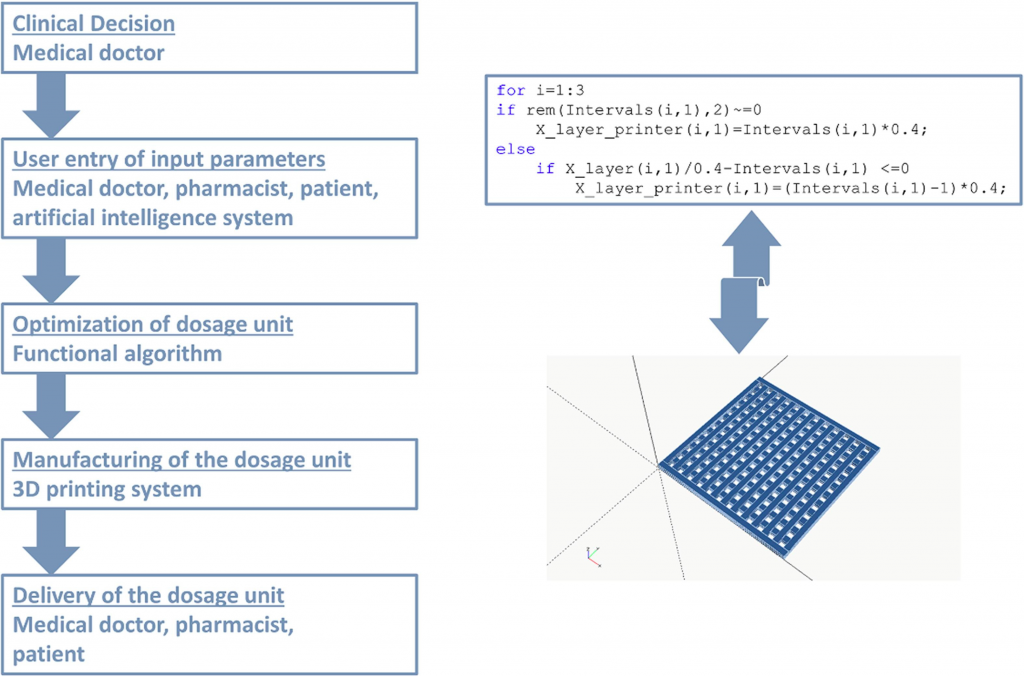A Swedish and Greek research team has developed an algorithm that enables custom 3D printed cannabidiol (CBD) tablets.
With the new structure of the scientists it is possible to produce “orodispersible films” or melting capsules with patient-optimized dimensions, dosages and drug release properties. The approach has already proven ideal for desktop 3D printing of CBD pills. In the future, the team believes that it can be used to manufacture customized drugs on-site in hospitals, pharmacies or even at patients’ homes.
“One in seven American citizens uses CBD,” the researchers write. “These products are freely sold in US pharmacies, and this uncontrolled distribution is making it easier to abuse.” Personalization of the drug is a potential measure to inhibit CBD abuse, as both the dose and the intended route of administration are customized for each patient. “
Finally, the scientists’ 3D printing algorithm could enable desktop 3D printer users to create bespoke CBD tablets at home. Photo via Pixabay.
3D printing homemade medicines
As the access to desktop 3D printers increases, the number of products that can be created with them increases exponentially. These systems, which are largely based on FFF, offer particular potential for the production of customer-specific drugs that can be programmed to suit a patient’s individual age, size, diet or life requirements.
Depending on the severity of a person’s condition, personalized drugs can even be critical to their chances of survival, which makes bespoke on-demand production extremely desirable. In other less severe cases, patients in the UK and US are increasingly using CBD products marketed in low concentrations as relaxants.
Lifesaving or not, these tablets are mass produced which limits their adaptability. The cost of CBD in the UK can be over £ 100 depending on the strength. In order to simplify the distributed medical production for daily use, the scientists have therefore developed an AI-controlled algorithm that automatically creates print-ready, patient-specific drug designs.
 A breakdown of the researchers’ CBD 3D printing algorithm. Image via the International Journal of Pharmaceutics.
A breakdown of the researchers’ CBD 3D printing algorithm. Image via the International Journal of Pharmaceutics.
Automated CBD production
In essence, the researchers’ proof-of-concept algorithm uses simple math functions to convert a person’s weight and dosage requirements into a 3D model for a bespoke tablet. As an added benefit, the software gives users an optimal set of parameters for each filament and generates a “Scad” file that is compatible with most machines.
Given the growing popularity of CBD, the scientists decided to test their algorithm by making cannabis-laden tablets using a MakerBot Replicator 2X 3D printer. The samples, 0.1 mm in height and containing 2%, 4% or 6% CBD, were found to be dimensionally accurate and demonstrated the precision of the team’s AI model.
Interestingly, the researchers later found that the width of the bars of the tablet ingredient fluctuated every time the printer’s nozzle passed over unevenly filled layers. While this phenomenon led to the accumulation of additional raw material, it had no effect on the CBD composition of each tablet, but it may warrant further investigation.
 During the first ten minutes of the test, over 90% of the scientists’ CBD tablets dissolved (Figure). Image via the International Journal of Pharmaceutics.
During the first ten minutes of the test, over 90% of the scientists’ CBD tablets dissolved (Figure). Image via the International Journal of Pharmaceutics.
In later tests, the scientists assessed the performance of their cannabis pills in vitro by exposing them to cell-laden shells. The results showed that the structural features and concentration of each capsule affected its disintegration time and that each individual tablet had released over 90% of its stated dose within ten minutes.
Despite their success in initial tests, the researchers also recognized the need for a more detailed algorithm that includes more parameters about a patient’s condition. In a world where online theft is becoming increasingly common, the processing of such personal data is another complication to a future distributed manufacturing model.
Given these potential setbacks, the scientists believe their approach is only a first step towards personalized CBD medication, but could ultimately help reduce abuse and treat conditions like anxiety or Parkinson’s.
“This approach is an alternative way to promote automation in the manufacture of highly personalized drugs,” the researchers concluded. “We assume that further pharmaceutical research and engineering solutions will gradually shape and realize the planned digital health environment.”
AM is making advances in clinical production
Research on 3D printed tablets has made leaps and bounds in recent years, producing dose-controlled devices for treating various diseases.
For example, researchers from University College London have 3D-printed opioid tablets with alcohol-resistant and abuse-deterrent properties. With their project, the team aims to combat the growing health crisis against opioid abuse caused by overprescribing high-strength pain relievers.
Similarly, Pakistani scientists have developed additively manufactured antibiotics to improve clinical outcomes for critically ill patients. By optimizing the parameters of their 3D printer, the researchers were able to precisely control the dosage levels of their drug delivery devices.
On a more commercial level, the pharmaceutical specialist FabRx is marketing its M3DIMAKER 3D printer, which has been specially developed for the production of personalized tablets. The device can not only create patient-specific dosage profiles, but also “polypills” that combine several drugs into a single printout.
The scientists’ results are detailed in their article entitled “Automated digital design for 3D-printed individualized therapies”. The study was co-authored by Georgios K. Eleftheriadis, Efthymios Kantarelis, Paraskevi Kyriaki Monou, Eleftherios G. Andriotis, Nikolaos Bouropoulos, Emmanouil K. Tzimtzimis, Dimitrios Tzetzis, Jukka Rantanen, and Dimitrios G. Fatouros.
During the project, the team worked in multiple locations including the Aristotle University of Thessaloniki, the International Hellenic University, the KTH Royal Institute of Technology, the University of Patras, the University of Copenhagen and the ICEHT.
Don’t forget to subscribe to the 3D printing industry newsletter or follow us on Twitter or visit our Facebook page to stay up to date with the latest news on 3D printing.
Are you looking for a job in the additive manufacturing industry? Visit 3D Print Jobs for a selection of roles in the industry.
The picture shows some cannabis seeds next to a bottle of CBD oil. Photo via Pixabay.
You may also like
-
CBD Treatment Solutions | Natural Healing Power
-
Exploring Cannabis Treatments for Insomnia: A Night Owl’s Guide to Sweet Dreams
-
CBD Oil Health Benefits: A Guide to Wellness and Vitality
-
Unlocking the Healing Potential: Cannabis CBD Oil Treatments Demystified
-
World CBD Pet Market 2021 Measurement, Improvement Technique, Evaluation, Alternative Evaluation, Key Gamers and Tendencies by Forecast 2026: Canna-Pet, CBD Dwelling, Charlottes Internet, Fomo Bones – KSU

